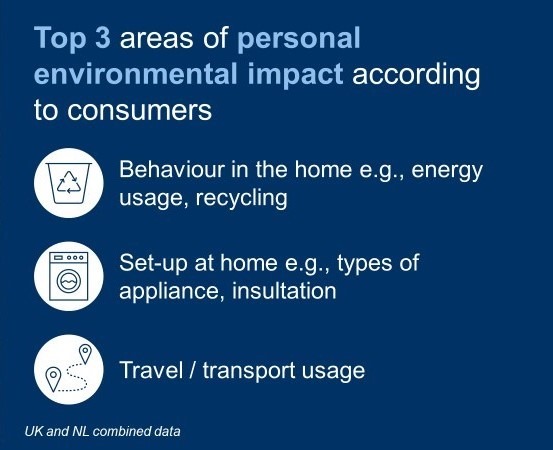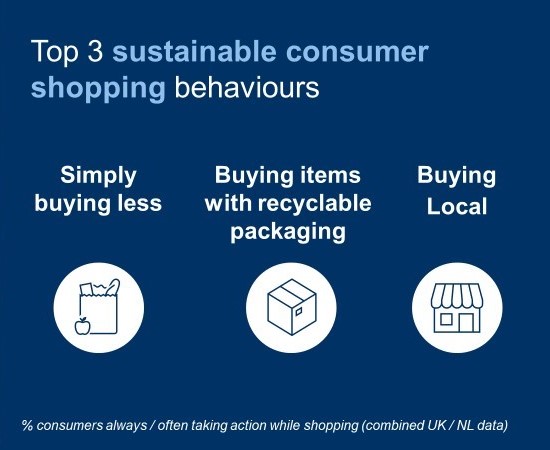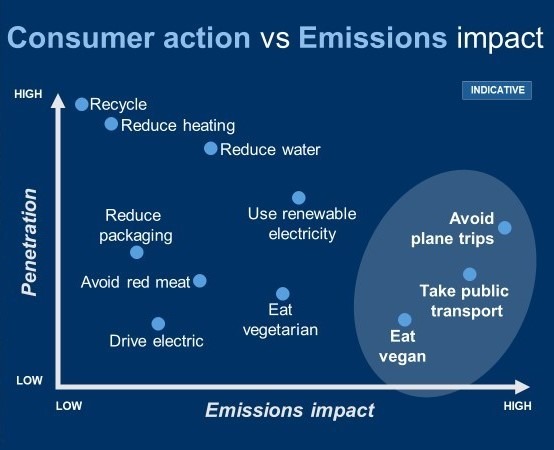Consumer Sentiment Pulse Check – Environmental Sustainability
In Glasgow the UN’s COP26 conference continues. But how are consumers responding now to the reality of climate change and what it might mean for their (sustainable) purchasing decisions?
To answer this question, Eden McCallum commissioned the second of its consumer surveys to test attitudes in both the UK and the Netherlands. A survey of around 1,000 consumers in each country found that concern about the environment is running high, even if individual actions in response to that vary.
One headline finding was clear: around 90% of people in both countries are concerned about the environment, with no great variation in that response across different age groups.
Which entities do consumers regard as having the biggest impact on the environment? While government is still seen as the most powerful actor in terms of its influence on the environment – in the UK 44% believe that government is very important – other players are seen as being almost as important. The survey found that companies are regarded as very important by 39% of UK respondents, global agencies by 36% and individuals according to 32%. In the Netherlands, companies and the government are seen as equally significant actors (32% see them as very important).
People in both countries believe that their individual actions have an important impact on the environment, not far behind those of governments, companies and global agencies. On a personal level, it is activities and behaviour at home that are seen as having the greatest impact on the environment. There is some degree of misalignment, however, between the actions consumers are taking and the efforts that will have the most impact on emissions.

In terms of specific activities and choices, in the UK, 68% see personal decisions – on energy usage and insulation – as mattering most, while diet and eating habits are seen as important by 56%. A similar but slightly larger gap in sentiment on these issues exists in the Netherlands.
However, not all age groups feel the same way. Younger generations attach more importance to shopping and eating habits. In general, the under 45s in the UK see shopping and eating habits as more important than older generations. In the Netherlands, the difference in attitude between the generations is smaller, with only eating being seen as slightly more important by younger respondents.
In the home, recycling and watching energy usage are the most common actions that people are taking. These are seen as most important in both countries by around three quarters of respondents.
When it comes to travel, almost half of UK consumers (46%) always or often walk as an alternative to using a car, bus, or train. 59% sometimes use public transport instead of getting into a car, and 53% sometimes take a train instead of getting on a plane. By contrast, when travelling almost half of Dutch consumers (47%) always or often cycle, or walk (34%), as an alternative to using a car, bus, or train. 52% take a train or coach instead of getting on a plane.
When shopping, just under half of UK consumers regularly opt for brands with sustainable packaging or simply try to buy fewer new products, 37% often shop locally or at independent shops, and 36% buy brands with good sustainability credentials. Dutch consumers are less likely to be taking specific actions when shopping, although around 40% are simply trying to buy fewer products and 31% of Dutch consumers often buy goods with no or reduced packaging.

We are what we eat, it is said. But increasingly people are recognising that what they choose to eat has big implications for the planet. About one-third of UK consumers try to avoid specific damaging ingredients and look for brands with good sustainability credentials. 31% often avoid red meat (beef and lamb); 26% often adopt a vegetarian diet. About a quarter of Dutch consumers try to avoid damaging ingredients and look for brands with good sustainability credentials. Fewer Dutch respondents try to avoid red meat (23%), 21% often adopt a vegetarian diet.
Younger respondents in both countries are more likely to have cut out specific food groups entirely: about 7 in 10 25-34 year olds avoid red meat and over 6 in 10 of that age group avoid dairy products.
Despite the high levels of concern and efforts being made by consumers, the climate change “mitigation options” with the highest potential impact are still largely minority pursuits. For example, becoming vegan or regularly choosing public transport over the car is still pretty rare.

Sara Ghazi-Tabatabai, Associate Partner at Eden McCallum, says that while awareness of climate change is clearly high, not everyone has decided to alter their behaviour in response to it. “Concern among consumers has not yet been transformed into concerted action among all age groups, or mass change in behaviour, particularly in the most impactful areas,” she says. “The challenge for responsible business leaders will be to work out where they can innovate boldly and encourage customer preferences to develop.”
For a full summary of the data and an individual look into market-specific results, click here for the UK data and click here for data from the Netherlands.

